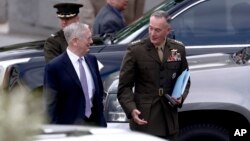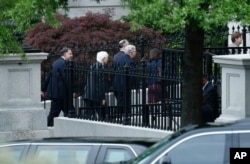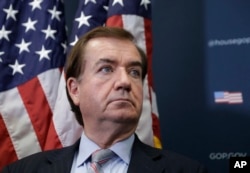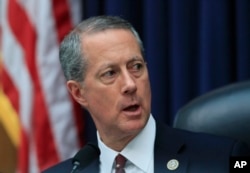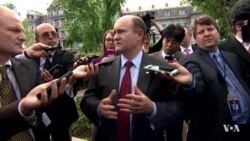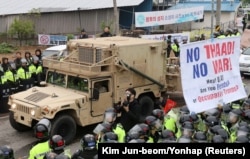Lawmakers from both the Senate and the House of Representatives received extraordinary classified briefings by the administration Wednesday.
Those attending were able to ask questions of the president's national security team and learn about the “broad range of options to remove this threat” from North Korea, which a senior administration official also described as “very grave” posed by the brutal and unpredictable Kim Jong Un regime.
All 100 senators gathered at mid-afternoon in an auditorium of the Executive Office Building, adjacent to the White House, for the briefing led by Defense Secretary Jim Mattis, Secretary of State Rex Tillerson, Director of National Intelligence Dan Coats and Chairman of the Joint Chiefs of Staff General Joseph Dunford.
President Donald Trump also was in attendance for a brief time, calling it a “very important” event.
“It was a sobering briefing in which it was clear just how much thought and planning is going into planning military options if called for, and a diplomatic strategy that strike me as clear eyed and well proportioned to the threat,” Democratic Senator Chris Coons, a member of the Foreign Relations Committee, told reporters afterward.
Before the briefers subsequently headed to Capitol Hill for a similar discussion, to which all the 431 current House members were invited, a joint statement issued by Tillerson and Coats warned that “we remain prepared to defend ourselves and our allies” if diplomacy fails to de-escalate North Korea's pursuit of weapons of mass destruction.
Sought briefing
Senate Republican Majority Leader Mitch McConnell said North Korea's unpredictability prompted him to ask the president to brief the full Senate.
“(He) has made clear that a North Korea that is armed with a nuclear missile, a capability they have yet to test, is unacceptable to us and threatens our vital national security interests,” McConnell said in remarks on the Senate floor.
The chairman of the Senate Armed Services Committee, Republican John McCain, made similar remarks, describing a nuclear capable North Korea as a threat of historic proportions.
“I think the situation in one respect is as dangerous as the Cuban missile crisis was,” he told VOA's Serbian Service. “But there's also another aspect to this, and that is that China can restrain North Korea. In other words, this is not just a question of confrontation between the United States and North Korea. The Chinese can control—and do control—the economy of North Korea. President Trump has established a relationship with the Chinese leader, and so one can at least know that that option is there.”
Later Wednesday afternoon, Vice President Mike Pence, Secretary of State Rex Tillerson and Secretary of Defense Secretary Mattis provided the full House of Representatives with a briefing for more than an hour.
“We have to take some concerted action,” House Foreign Affairs Chairman Ed Royce, a Republican from California, told reporters afterwards.
Royce said his committee will move to discuss options in the weeks ahead, including the need for financial sanctions against North Korea.
“If there is a diplomatic path, it runs through China,” said Rep. Adam Schiff, the ranking Democrat on the House Intelligence Committee. “We need to impress on China that we need to take steps to protect ourselves and our allies in the absence of more vigorous action from China to reign in their neighbor.”
Chinese Foreign Ministry spokesman Geng Shuang said Thursday that China wants to work with all relevant parties, including the U.S., in order to bring about a peaceful resolution. But he added that China has consistently implemented United Nations Security Council sanctions imposed against North Korea, and that it does so out of international obligation and not pressure from another nation.
Schiff said the Trump administration's briefers were thorough and thoughtful in addressing questions from members of Congress. But he asked for a careful approach from the White House moving forward.
“I would advise the administration to be very careful about any miscalculation — we are dealing with an erratic regime, a young, inexperienced leader who murders members of his own family and I think the best approach for the administration to bring maximum pressure to bear diplomatically on China as well as North Korea but otherwise to walk softly and carry a big stick,” Schiff said.
“There's tremendous confidence in the administration officials in key positions. They knew what they were talking about, they were coordinated, and did a great job,” said Rep. Mac Thornberry, a Republican from Texas.
Thornberry, the head of the House Armed Services Committee, said the briefing showed the key role Congress can play in fully funding the U.S. military.
“A key part of this has to be a credible military deterrent. We can do our part in Congress by making sure the militaries funded for the rest of this year have an adequate funding for next year. So all of this works hand in glove it's important to have economic, diplomatic pressure, but you have to have a credible military deterrent in order to achieve the results,” he added.
USS Carl Vinson
Meanwhile, a U.S. Navy strike force, led by the aircraft carrier USS Carl Vinson, is approaching the east coast of the Korean peninsula. A Navy nuclear submarine armed with guided missiles, the USS Michigan, also has made a call to the port of Busan in South Korea, as an additional show of force to North Korea.
Trump and U.S. officials have repeatedly said all options remain “on the table” to deal with further North Korean provocations.
Watch: US Lawmakers Briefed on North Korean Threat
A long-awaited U.S. missile defense system will be operational in South Korea within a matter of days to help protect the country from a possible strike by North Korea.
The commander of U.S. forces in the Pacific region gave the assurance on the Terminal High Altitude Area Defense System, also known as THAAD, Wednesday during an appearance before the House Armed Services Committee.
“It will be operational in the coming days and able to better defend South Korea,” Pacific Command Commander Adm. Harry Harris told U.S. lawmakers, warning the threat from Pyongyang is not limited to the Korean Peninsula.
“With every test, Kim Jong Un moves closer to his stated goal of a preemptive nuclear strike capability against American cities,” the admiral added.
He also urged lawmakers to consider placing additional missile defense systems in Hawaii.
China reiterated Thursday it is "resolutely opposed" to the THAAD deployment, saying it harms stability in the region.
Fresh warning
In a repeat of often-heard rhetoric, North Korea's foreign ministry issued a fresh warning that "in case a war breaks out on the peninsula, the U.S. will be held wholly accountable for causing trouble after bringing lots of strategic assets and special warfare means."
North Korea's official news agency, KCNA, characterized current joint drills between the U.S. and South Korean navies as a prelude to an invasion.
Trump has said Chinese President Xi Jinping is applying pressure on North Korea to not engage in further provocations. It is speculated by analysts in Washington and Beijing that China is threatening to cut crude oil supplies to its impoverished neighbor should it conduct another nuclear test.
“I’m reasonably optimistic now that China is having an influence … working in the right direction,” Admiral Harris said. “And I believe Kim Jong Un has noticed that there's a change afoot with regard to China.”
Still, Harris cautioned, “It's early days.”




